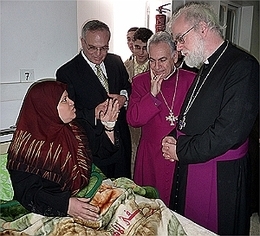Archbishop in West Bank and Gaza
 The Ahli Arab Hospital, Gaza
The Ahli Arab Hospital, GazaWednesday 24th February 2010
The Archbishop of Canterbury, Dr Rowan Williams, accompanied by the Anglican Bishop in Jerusalem Dr Suheil Dawani and the Bishop of Clogher and chairman of the Anglican Inter Faith Concerns (NIFCON) of the Anglican Communion, Rt Reverend Michael Jackson, visited the West Bank to meet representatives of the local Christian community, the Palestinian Authority, local civic authorities and to visit Church run institutions in the health sector.The Archbishop met the Palestinian Prime Minister, Dr Salam Fayyad at a reception for the local community in Ramallah on Monday 22 February. The reception was also attended by the Mayor of Ramallah Mrs Janet Khouri, and the Governor of Ramallah Leila Ghannam. In twenty minutes of lively and engaged discussion the Archbishop and Prime Minister Fayyad spoke about the challenges currently facing the Palestinian community in the West Bank, the state of the peace process, and prospects for continued improvements for the economy of the West Bank, and the urgent need for investment. The Prime Minister spoke warmly of the vibrant and important contribution made by the Christian community and Anglican institutions such as St Luke's Hospital in Nablus to the whole of the Palestinian community, regardless of faith. He also spoke of his personal concern at the continuing shrinking of numbers of Christians living on the West Bank and of the importance of halting, and ideally reversing, that process.
The Archbishop spoke of his and the Anglican Communion's pride in the contribution local Christians were making to the service of the whole community in very challenging circumstances. The suffering of the Palestinian community called for courage and generosity. It was in the interests of all in the region that peace with justice be secured. The well being of all communities in the region were inter-dependent. Peace would not be achieved without sacrifice on all sides because the interests of one were intimately bound up with the interests of the other.
Bishop Michael Jackson returned to the West Bank on 23 February to pay a pastoral visit to the newly renovated St Luke's hospital in Nablus. "What I found there was nothing short of inspirational. Despite tremendous shortages of equipment and medicines St Luke's serves the whole of the community without exception, to the very best of its capacity and with a dedication which is humbling to witness. I want now to ensure that, alongside my own diocese which already has a relationship with St Luke's, others in the Church know how great the needs are, what can be, and is being, done often with very little basic equipment, and respond generously in whatever ways we can."
Archbishop Williams and Bishop Dawani paid a pastoral visit to the Ahli Arab Hospital in Gaza on Tuesday 23rd February. The hospital is run by the Anglican Diocese of Jerusalem. The continuing humanitarian crisis was evident with acute, and well-documented, shortages of basic foodstuffs, medicines and building materials. In the face of the very grave situation facing the inhabitants of Gaza the Ahli Hospital provides desperately needed health care. Though small in size the hospital provides in patient care to a maximum of 80 patients with a range of medical and surgical needs, as well as providing in 2009 care or treatment to 42,000 outpatients (nearly double the figure for 2008). In the course of the visit, the Archbishop and Bishop Dawani rededicated the St Philip's Chapel which had been damaged during the conflict and newly renovated for use by the hospital staff and community.
The Director of the Hospital Ms Suheila Tarazi spoke movingly of the vocation of the hospital and its staff to respond to the Christian imperative to serve the poor. "We seek," she said, "to bring hope to the hopeless and bring good news to the poor". "Ahli is," she said, "a tangible sign of how Christians can serve their fellow human beings in love". She paid tribute to the co-operative spirit which existed between the two communities – Christian and Muslim – in responding to the current grave crisis – itself a reflection of traditional Arab hospitality.
The Archbishop recalled the appeal in 2009 to which all three communities – Jewish, Muslim and Christian – had responded so generously in support, among other humanitarian projects, of the Ahli Hospital in the wake of the January 2009 conflict. He urged a greater awareness of the humanitarian crisis and isolation which had ensued, to ensure that the people of Gaza were not forgotten. He paid tribute to the constant, caring and skilled work done by the hospital and its staff for people of all backgrounds, regardless of faith. "It was," he said, "a model of service born in, and sustained by love – a model response to our Christian calling." He paid tribute to the contribution of the diocese, out of all proportion to its numerical presence, and pledged the continuing prayers and support of the Anglican Communion as a whole, and his personal support and prayers for all who felt so little hope for the future: "God's faithfulness is sure and will never fail". His continuing prayer and hope was for "peace and for justice for all the people of the region".
